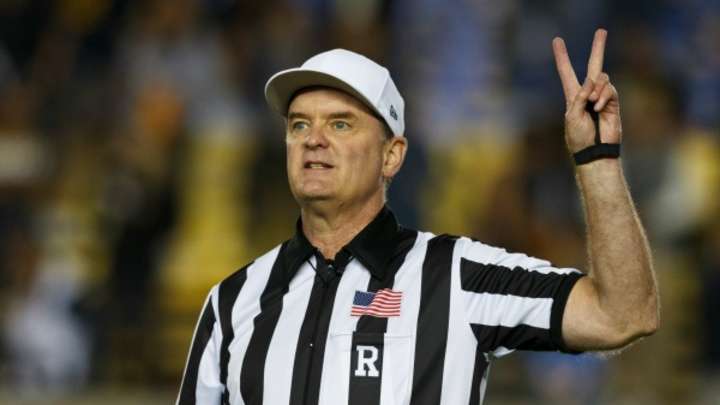NCAA proposes defensive substitution period, targeting rule change

NCAA referees may begin enforcing defensive substitution periods in 2014. (Jason O. Watson/Getty Images)
The NCAA Football Rules Committee proposed rules changes Wednesday that could keep hurry-up offenses waiting and take away 15-yard penalties if a targeting hit is overruled during the 2014 season.
All rules proposals must be approved by the NCAA Playing Rules Oversight Panel in March after reviewing membership comments.
The committee recommended allowing defensive units to substitute within the first 10 seconds of the 40-second play clock, with the exception of the final two minutes of each half. The offense wold not be allowed to snap the ball until the play clock reaches 29 seconds or less. Snapping the 29-second mark would result in a 5-yard, delay-of-game penalty against the offense.
Under current rules, defensive players are not guaranteed an opportunity to substitute unless the offense substitutes first. This part of the rule will remain in place in scenarios where the play clock starts at 25 seconds.
Committee member and Air Force head coach Troy Calhoun said in an NCAA statement the defensive substitution proposal backs research indicating that teams using fast-paced, no-huddle offense schemes rarely snap the ball with 30 seconds or more on the play clock. The proposed change also addresses a motion from the Committee on Competitive Safeguards and Medical Aspects of Sports that a substitution rule would improve player safety.
“This rules change is being made to enhance student-athlete safety by guaranteeing a small window for both teams to substitute,” said Calhoun. “As the average number of plays per game has increased, this issue has been discussed with greater frequency by the committee in recent years and we felt like it was time to act in the interests of protecting our student-athletes.”
Current rules do not put the brakes on offenses designed to make defensive substitutions more difficult.
MANDEL: Is oversigning still a major recruiting problem?
Calhoun said fine-tuning the targeting rule and eliminating the 15-yard penalty after being overturned by replay will still make play safer.
“Overall, the targeting rule was successful and has had the intended impact of making play safer,” said Troy Calhoun, head coach at the Air Force Academy and chair of the committee, which met Monday through Thursday in Indianapolis. “This alteration keeps the intent of the rule, but allows replay to correct all of the consequences from a rare missed call.”
Washington State head coach Mike Leach weighed in with his thoughts on the 29-second snap rule via ESPN Pac-12's Twitter feed:
